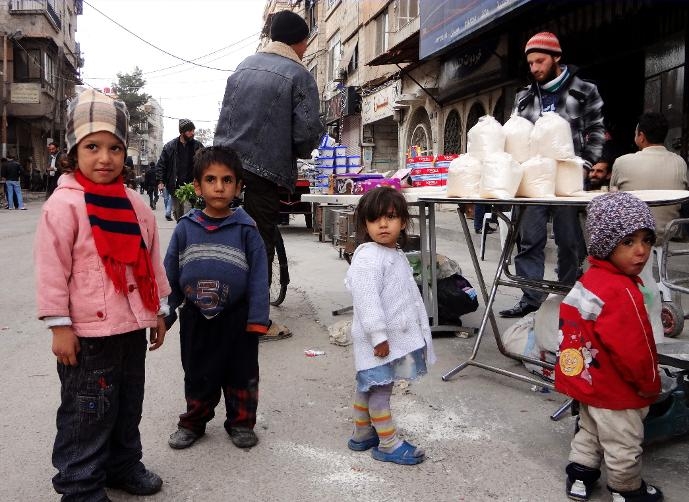In the past, towns and villages of Damascus' Ghouta district provided the Syrian capital with a rich supply of food and fresh produce. Now, after three years of siege, these areas remain poor and remote, cut off from the rest of Syria.
In an attempt to fight starvation and stay alive, many residents have been forced to search for alternative food sources that are often rotten or unfit for human consumption.
"There is no more food here. The siege has forced us to look to other kinds of food to stay alive. Starvation does not discriminate between children and grown-ups,” said Mahmoud, a 25-year-old who works in a bakery.
"Flour has become a luxury that is usually sold for more than 1,000 Syrian pounds, so we have started baking bread using different kinds of available ingredients, like corn, chickpeas and pasta. However, when these ingredients began to dwindle after three years of siege, we started using things like barley and fodder that we usually feed to animals. Barley bread has since become the daily food for the people of Ghouta," Mahmoud added.
"The shelling and siege have not only killed people, but also plants and animals. Many locals have lost their land due to the constant shortage of water and electricity for over three years," said Douma resident Abou Omar.
"Many of our animals were killed during the shelling, but the real problem is that we started using their fodder for food, leaving them with nothing but green grass to feed on," added Abou Omar.
Mystery Meat Sold Cheap in Douma Markets
"We saw Saed running toward the butcher and attack his head with a metal pole. The butcher fell to the ground covered with blood, and the neighbors intervened to stop Saed, who was suffering from a nervous breakdown at the time. Afterwards, members of the Army of Islam came and arrested everyone," said businessmen Abou Ahmed.
Saed earns 1,200 pounds a day digging tunnels used to break the siege imposed on Ghouta. According to his friend, Amer, Saed went to the sheep market in the middle of Douma to buy a kilogram of meat. He paid 1,700 pounds for the meat, which is 2,000 pounds cheaper than the average market price. According to the butcher, the difference in price was due to a lack of fodder and the sickness of his sheep.
"Saed wanted to bring some joy to the hearts of his brothers and sisters, who had forgotten the meaning of happiness ever since their mother died in a raid by regime warplanes on Ghouta," Amer said.
Saed rushed to his sister’s house to give her the meat before heading home to see his wife and little girl. The next day, while he was digging a tunnel, his wife came to see him. She was crying and her face was pale, and she whispered something into his ear that made him weep. He rushed off holding a metal stick as if he had lost his mind.
"He was running with a stick in his hand. When he reached the butcher he hit him on the head and he fell down unconscious. The neighbors and I gathered to stop Saed, who had completely collapsed," said Abou Ahmed. He paused for a moment, then continued with a serious tone: "Saed repeated with a weak voice, ‘my sister is dead, I have killed my sister.’"
Hours later, according to the neighbors, members of the Army of Islam arrived to the area and arrested everyone who worked at the butchers before closing the shop. It turned out that many other people were poisoned and some had died after eating the same meat, which was later discovered to have come from donkeys, cats and dead cows.
This article does not necessarily reflect the opinion of The Syrian Observer.


